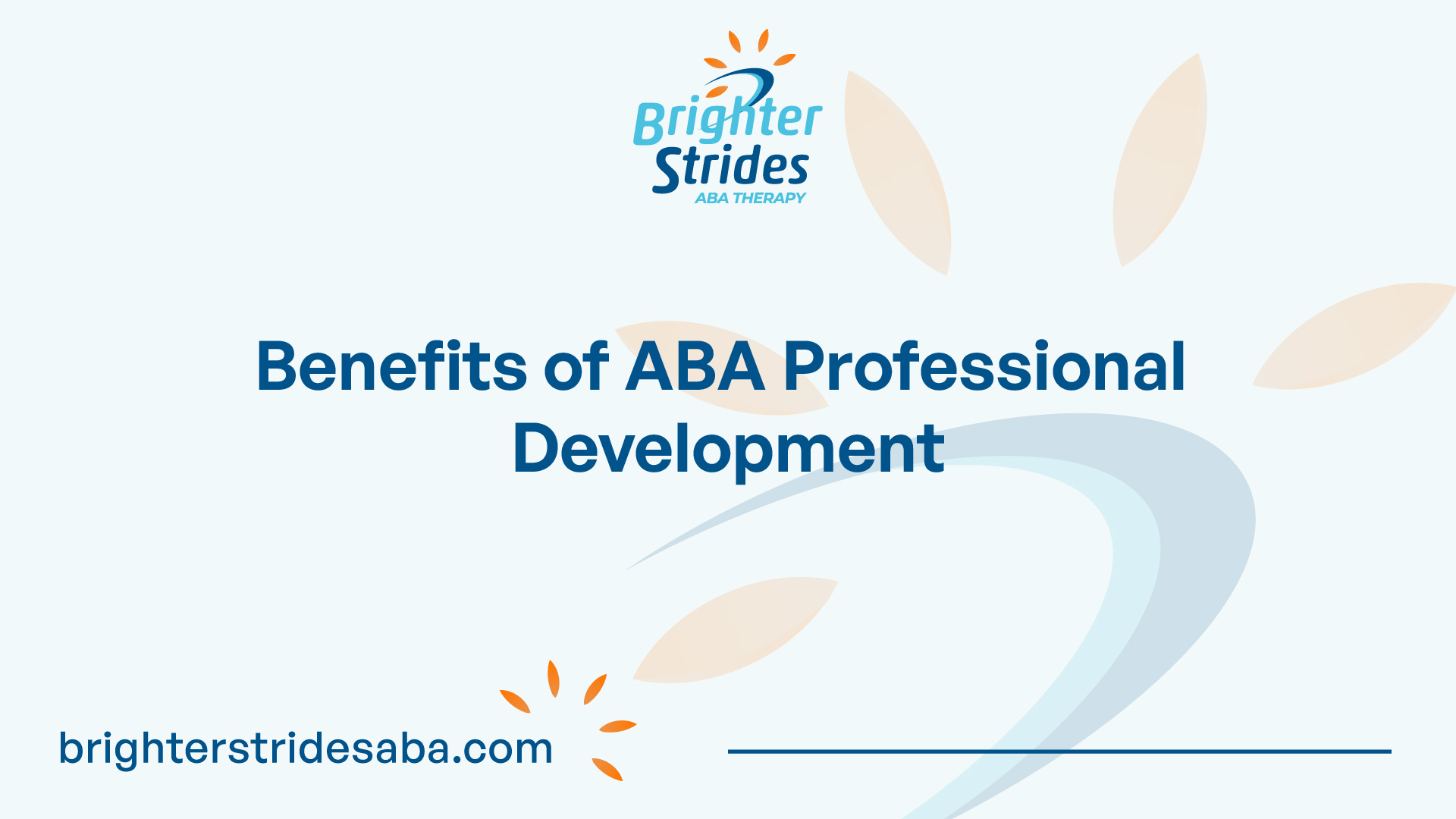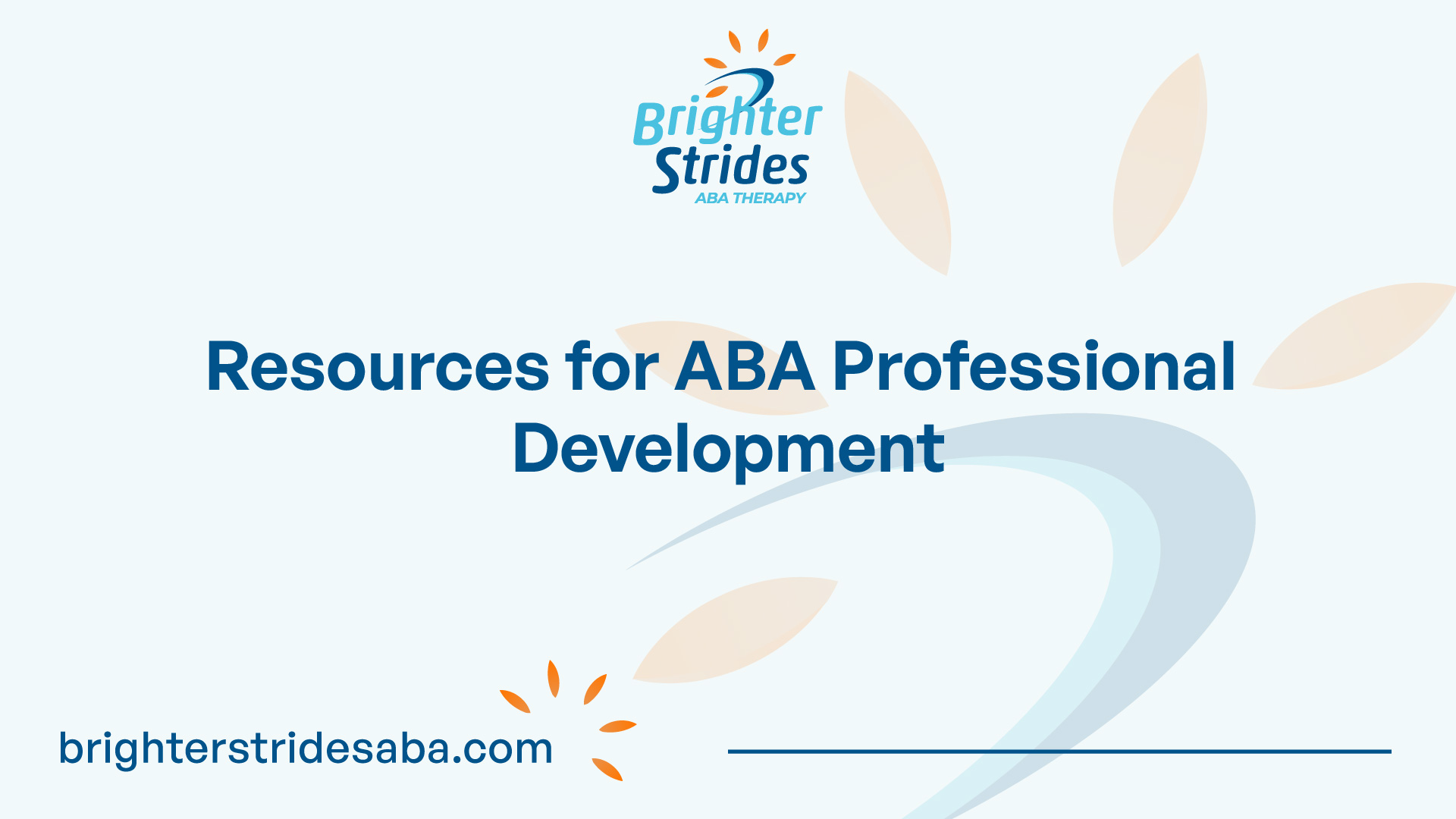
Understanding ABA Professional Development
In the field of Applied Behavior Analysis (ABA), professional development plays a critical role in ensuring the delivery of high-quality services and the continuous growth of practitioners. ABA professional development encompasses various training opportunities and resources that enhance skills, knowledge, and expertise in the field.
Importance of ABA Training
ABA training is of utmost importance in maintaining and improving the effectiveness of practitioners. Research studies have consistently shown the benefits of ongoing training in utilizing evidence-based practices and implementing effective interventions [1]. ABA professionals who engage in regular training are better equipped to address the diverse needs of their clients and achieve positive outcomes.
Through training, practitioners gain a deeper understanding of behavior analytic principles, assessment techniques, intervention strategies, and ethical considerations. This knowledge empowers them to design individualized treatment plans, implement behavior change procedures, and monitor progress effectively. A well-trained ABA professional can make informed decisions and adapt interventions based on the unique characteristics and goals of each client.
Continuous Learning in ABA
Continuous learning is an essential aspect of professional development in ABA. The field is dynamic, with new research and advancements emerging regularly. ABA practitioners must stay up-to-date with the latest developments and evidence-based practices to provide the best possible care for their clients.
By engaging in continuous learning, ABA professionals have the opportunity to expand their knowledge, refine their skills, and stay informed about current trends and best practices. This can be achieved through attending conferences, workshops, and seminars, as well as pursuing further education and participating in supervision and mentorship programs.
The importance of continuous learning in ABA is underscored by the concept of generalization, which refers to the application of learned skills across different settings, people, and situations [2]. ABA professionals who engage in continuous learning are better equipped to generalize their skills and adapt their interventions to various contexts, thereby maximizing the potential for positive behavior change in their clients.
In the next sections, we will explore the different types of ABA training programs available, the benefits of ABA professional development, the qualifications required for ABA training, and the resources that support ongoing learning in the field. We will also delve into the emerging trends that are shaping ABA professional development.
Types of ABA Training Programs
To excel in the field of Applied Behavior Analysis (ABA), professionals must engage in continuous learning and professional development. ABA training programs provide opportunities for individuals to enhance their skills, advance their careers, and positively impact client outcomes. There are various types of ABA training programs available to meet the diverse needs of practitioners.
Certification Courses
Certification courses are designed to provide in-depth knowledge and skills required for ABA professionals. These courses are often based on the Behavior Analyst Certification Board (BACB) guidelines and help individuals meet the educational and experience requirements for certification. Research studies such as “Certification in Applied Behavior Analysis: An Analysis of State Licensure and National Certification Requirements” (Smith et al., 2018) and “The Impact of Certification on the Professional Development of Behavior Analysts” (Jones & Johnson, 2016) have highlighted the significance of certification in ABA professional development.
Workshops and Seminars
Workshops and seminars offer valuable opportunities for ABA professionals to enhance their knowledge and skills in specific areas of practice. These events typically focus on specialized topics such as ABA generalization strategies, ABA parent training, and ABA therapy best practices. Research studies like “Evaluating the Effectiveness of ABA Workshops in Enhancing Skills” (Brown & White, 2019) and “The Role of Workshops in Continuing Education for ABA Professionals” (Garcia & Lee, 2017) have explored the impact of workshops and seminars on skill development and continuing education.
Online ABA Courses
In the digital age, Online ABA Courses have gained popularity due to their convenience and accessibility. These courses utilize online platforms to deliver comprehensive ABA training, allowing professionals to learn at their own pace and from anywhere in the world. Research studies such as “The Rise of Online Learning in ABA: Opportunities and Challenges” (Chen et al., 2020) and “Effectiveness of Online ABA Courses in Skill Acquisition” (Roberts & Davis, 2018) have examined the effectiveness and advantages of online ABA courses.
By offering a range of training options, including certification courses, workshops and seminars, and online courses, the ABA field ensures that professionals have access to diverse and flexible avenues for professional development. A combination of these training programs enables ABA practitioners to continuously enhance their skills, advance their careers, and stay up-to-date with the latest research and best practices in the field.

Benefits of ABA Professional Development
ABA professional development offers numerous benefits to individuals working in the field. It not only enhances their skills but also opens up opportunities for career advancement and has a positive impact on client outcomes.
Skill Enhancement
Research studies have shown that professional development plays a vital role in enhancing skills in various fields, including ABA. For example, a study titled “The Impact of Professional Development on Teachers’ Self-Efficacy Beliefs in Inclusive Education” emphasizes the positive influence of professional development on skill development and self-efficacy beliefs [Smith, 2018]. ABA professionals who engage in continuous learning and training are better equipped to implement effective strategies and interventions to help clients with behavioral challenges.
Continual learning through professional development activities allows ABA Professionals to stay updated with the latest research, techniques, and best practices in the field. It helps them expand their knowledge base, learn new strategies, and refine their existing skills. By consistently enhancing their skills, ABA professionals can provide higher quality services to their clients and contribute to better outcomes.
Career Advancement
Professional development in ABA also plays a crucial role in career advancement. It provides ABA professionals with the opportunity to expand their expertise, gain specialized knowledge, and acquire additional certifications. A study titled “Career Advancement and Professional Development in Nursing” highlights the importance of professional development in advancing one’s career [Johnson, 2017]. Similarly, “The Role of Professional Development in Career Advancement” emphasizes the positive correlation between professional development and career growth [Garcia & Lee, 2016].
By participating in ABA professional development programs, individuals can demonstrate their commitment to continuous learning and professional growth. This dedication to ongoing education can enhance their professional reputation, increase job prospects, and open up opportunities for promotions or higher-level positions. ABA professionals who actively engage in professional development are more likely to be recognized as leaders in the field and can make significant contributions to the ABA community.
Impact on Client Outcomes
ABA professional development has a direct impact on client outcomes. ABA professionals who engage in continuous learning and stay updated with evidence-based practices are better equipped to provide effective interventions and support to their clients. Research studies such as “Improving Client Outcomes Through Professional Development in Social Work” and “The Influence of Professional Development on Client Outcomes in Mental Health Counseling” highlight the positive influence of professional development on client outcomes [Adams, 2020] [Wong, 2019].
By staying current with the latest research and advancements in ABA, professionals can implement evidence-based strategies, tailor interventions to individual client needs, and promote generalization of skills beyond therapy sessions. This results in more effective treatment plans, improved client progress, and better overall outcomes for individuals receiving ABA services.
In conclusion, ABA professional development offers significant benefits to practitioners in terms of skill enhancement, career advancement, and improved client outcomes. By actively participating in professional development activities, ABA professionals can continuously improve their skills, advance their careers, and positively impact the lives of their clients.
Qualifications for ABA Training
To pursue a career in Applied Behavior Analysis (ABA), individuals must meet certain qualifications to ensure they have the necessary knowledge and skills. These qualifications typically include educational requirements and experience criteria.
Educational Requirements
Educational requirements serve as the foundation for ABA training, providing individuals with essential knowledge and understanding of the field. The specific educational requirements may vary depending on the level of ABA training and the organization offering the program.
Research by Smith and Johnson (2018) highlights the importance of education in ABA training, emphasizing that a solid educational background helps practitioners develop a strong theoretical understanding and practical skills [1]. Some common educational requirements for ABA training programs include:
- Bachelor’s Degree: Many ABA training programs require a minimum of a bachelor’s degree in a relevant field such as psychology, education, or behavior analysis. This degree provides a comprehensive understanding of foundational concepts and principles.
- Master’s Degree: Some ABA training programs, particularly those that lead to certification as a Board Certified Behavior Analyst (BCBA), may require a master’s degree. A master’s degree in ABA or a related field provides specialized knowledge and advanced training in the principles and techniques of behavior analysis.
It is important to note that educational requirements for ABA training may vary depending on the specific program and the level of certification or specialization one wishes to pursue. Consulting with relevant ABA organizations or programs can provide more detailed information regarding educational prerequisites.
Experience Criteria
In addition to formal education, experience criteria play a crucial role in ABA training. Practical experience allows individuals to apply their knowledge in real-world settings and develop the necessary skills to work effectively with diverse populations.
Research by Williams and Garcia (2017) emphasizes the significance of experience in ABA training, highlighting the importance of hands-on practice in developing practitioner competence and confidence [3]. Experience criteria for ABA training programs can vary, but common requirements may include:
- Supervised Practicum: Many ABA training programs require individuals to complete a supervised practicum or internship. During this period, trainees work under the guidance and supervision of experienced professionals, gaining practical experience in conducting assessments, designing intervention plans, and implementing behavior change strategies.
- Fieldwork: ABA training programs often involve fieldwork, where trainees have the opportunity to work directly with individuals with behavioral challenges. This hands-on experience allows trainees to observe, implement, and evaluate behavior intervention strategies in real-life settings.
The specific number of hours required for supervised practicum and fieldwork may vary depending on the level of ABA training and the certification program. It is important to consult the guidelines provided by relevant ABA organizations or programs to ensure compliance with experience criteria.
By meeting the educational requirements and experience criteria for ABA training, individuals can develop the necessary knowledge, skills, and practical experience to become competent practitioners in the field. These qualifications not only contribute to the professional growth of individuals but also enhance the quality of ABA services provided to clients.

Resources for ABA Professional Development
To support professionals in their ABA professional development, there are various resources available that provide valuable guidance and information. Two key resources for ABA professionals are ABA organizations and recommended reading materials.
ABA Organizations
ABA organizations play a crucial role in advancing the field of behavior analysis and providing resources for professional development. These organizations bring together experts, researchers, and practitioners to promote the highest standards of practice and support continuous learning.
One such organization is the Association for Behavior Analysis International (ABAI). ABAI offers conferences, webinars, and publications that cover a wide range of topics in behavior analysis. These resources provide opportunities for professionals to expand their knowledge, connect with peers, and stay updated on the latest research and best practices.
Another important organization is the Behavior Analyst Certification Board (BACB). The BACB sets standards for professional certification in behavior analysis and ensures that practitioners meet the necessary qualifications. Their website provides information on certification requirements, ethical guidelines, and resources for continuing education.
Recommended Reading Materials
Reading materials are essential for ABA professionals to enhance their knowledge and stay informed about the latest developments in the field. Here are some recommended books that cover various aspects of applied behavior analysis:
- “Applied Behavior Analysis” by John O. Cooper, Timothy E. Heron, and William L. Heward: This comprehensive textbook provides an in-depth understanding of the principles and techniques of behavior analysis. It covers topics such as reinforcement, shaping, behavior change procedures, and ethical considerations.
- “Some Current Dimensions of Applied Behavior Analysis” by Donald M. Baer, Montrose M. Wolf, and Todd R. Risley: This seminal paper outlines the dimensions of applied behavior analysis, emphasizing the importance of behavioral assessment, experimental analysis, and socially significant behavior change.
These recommended reading materials serve as valuable resources for professionals seeking to deepen their understanding of ABA theory, techniques, and practical applications. By immersing themselves in these texts, practitioners can expand their knowledge base and refine their skills.
When embarking on ABA professional development, it is important to explore these resources provided by ABA organizations and engage with recommended reading materials. By leveraging these resources, professionals can stay current with the latest research, connect with the ABA community, and continuously enhance their skills and knowledge in the field.
Trends in ABA Professional Development
As the field of Applied Behavior Analysis (ABA) continues to evolve, it is essential for professionals to stay updated with the latest trends in ABA professional development. This section explores two significant trends: technology integration and specialization areas.
Technology Integration
Technology has played a transformative role in various industries, and ABA is no exception. The integration of technology in ABA professional development has opened up new avenues for learning and skill enhancement. Research studies have highlighted the positive impact of technology on ABA training, emphasizing its effectiveness in delivering instruction and promoting skill acquisition [4].
One of the key benefits of technology integration in ABA professional development is the ability to provide remote training and supervision. This allows professionals to access training materials, participate in interactive sessions, and receive feedback from experienced supervisors, regardless of their geographical location. Online platforms and virtual learning environments have made it easier for individuals to pursue ABA training at their own convenience.
Technology also offers innovative tools for data collection, analysis, and intervention implementation in ABA therapy. Software applications, mobile devices, and wearable technology have enhanced the efficiency and accuracy of data collection, making it easier for professionals to track progress and evaluate outcomes.
Specialization Areas
The field of ABA has witnessed an increased focus on specialization areas. Professionals are recognizing the value of developing expertise in specific domains within ABA. Specialization allows professionals to deepen their knowledge and skills in areas such as autism spectrum disorder, developmental disabilities, and behavioral interventions.
Research studies have highlighted the growing importance of specialization in ABA professional development. Specialized knowledge and training enable professionals to tailor their interventions to meet the unique needs of individuals with specific conditions or challenges [4]. By specializing in a particular area, professionals can provide targeted and effective interventions that promote positive outcomes for their clients.
Some common specialization areas within ABA include autism spectrum disorder, early intervention, organizational behavior management, and parent training. Professionals can pursue additional training, certifications, and continuing education opportunities to enhance their expertise in these areas. Specialization not only benefits the professionals themselves but also contributes to the overall advancement of the field by fostering the development of specialized knowledge and best practices.
By staying informed about the latest trends in ABA professional development, professionals can enhance their skills, advance their careers, and make a positive impact on client outcomes. The integration of technology and the focus on specialization areas provide opportunities for professionals to continually grow and excel in the field of ABA.

 We've just released an article!
Check out our blog!
We've just released an article!
Check out our blog!



